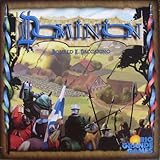Bank

This is a Treasure worth a variable amount. When you play Bank, it is worth  per Treasure you have in play, counting itself. Remember, you choose what order to play Treasure cards.
per Treasure you have in play, counting itself. Remember, you choose what order to play Treasure cards.
If you play Bank with no other Treasures in play, it is worth  . If you play two copies of Bank in a row, the one you play second will be worth
. If you play two copies of Bank in a row, the one you play second will be worth  more than the first one. Bank produces money right when you play it; things that happen later in the turn will not change how much money you got from it.
more than the first one. Bank produces money right when you play it; things that happen later in the turn will not change how much money you got from it.
Bishop

See the Additional Rules section for rules on  tokens. Trashing a card is optional for the other players but mandatory for you. If players care about the order things happen for this, you trash a card first, then each other player may trash a card, in turn order.
tokens. Trashing a card is optional for the other players but mandatory for you. If players care about the order things happen for this, you trash a card first, then each other player may trash a card, in turn order.
Only the player who played Bishop can get  tokens from it.
tokens from it.  in costs is ignored, for example if you trash Golem (from Dominion: Alchemy), which costs
in costs is ignored, for example if you trash Golem (from Dominion: Alchemy), which costs 
 , you get 3
, you get 3  total (counting the 1 you always get from Bishop). If you have no cards left in hand to trash, you still get the
total (counting the 1 you always get from Bishop). If you have no cards left in hand to trash, you still get the  and 1
and 1  .
.
City

You draw a card and can play two more Actions no matter what. If there is just one empty pile in the Supply, you also draw another card. If there are two or more empty piles, you both draw another card, and get to spend and an extra Buy to use in the Buy phase. There are no further bonuses if three or more piles are empty.
This only checks how many piles are empty when you play it; if piles become empty later in the turn, you do not go back and get the bonuses.
If a pile stops being empty due to cards being returned to it, such as with the Dominion: Seaside card Ambassador, Cities played after that will not count that pile as empty. An empty trash pile does not count for this.
Colony
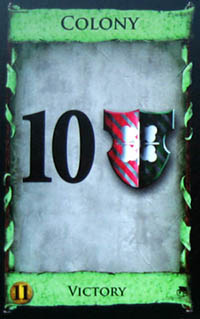
This is not a Kingdom card. You do not use it every game; see the setup section. It is a Victory card worth 10  .
.
Contraband
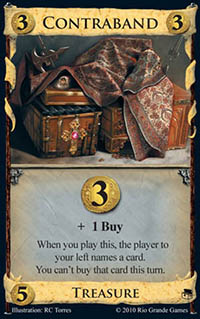
This is a Treasure worth  , like Gold. When you play it, you get +1 Buy, the player to your left names a card, and you cannot buy the named card this turn.
, like Gold. When you play it, you get +1 Buy, the player to your left names a card, and you cannot buy the named card this turn.
This does not stop you from gaining the card in ways other than buying it (such as via Hoard). He does not have to name a card in the Supply. If you play multiple Contrabands in one turn, the player to your left names a card each time; if he names different cards, you cannot buy any of the named cards this turn.
You can play Treasures in any order, and you resolve this ability right when you play it, before playing any further Treasure cards. Note that once you buy a card in the Buy phase, you cannot play more Treasures. The number of cards left in a player's hand is public information; you can ask whenever you want to know it (for example, when that player plays Contraband).
Counting House
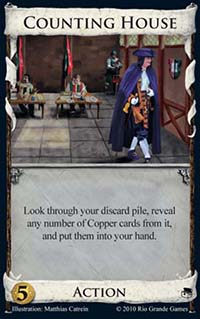
This card lets you look through your discard pile, something you normally are not allowed to do. You only get to look through your discard pile when you play this.
You do not have to show the other players your entire discard pile, just the Coppers you take out. After you take out the Coppers, you can leave the cards in your discard pile in any order.
Expand
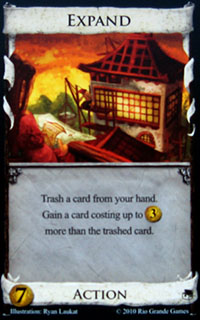
This is not in your hand after you play it, so you cannot trash it as the card trashed. The card you gain can cost up to  more than the trashed card, but it can also cost any smaller amount, even less than the cost of the trashed card. You can trash a card and gain a copy of the same card. If you have no card in hand to trash, you do not gain a card. The card you gain comes from the Supply and is put into your discard pile.
more than the trashed card, but it can also cost any smaller amount, even less than the cost of the trashed card. You can trash a card and gain a copy of the same card. If you have no card in hand to trash, you do not gain a card. The card you gain comes from the Supply and is put into your discard pile.
Forge
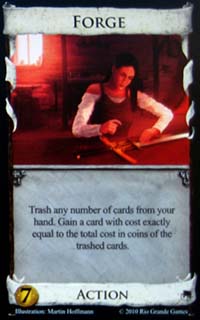
"Any number" includes zero. If you trash no cards, you have to gain a card costing  if you can. This is different from how cards like Expand work if you do not trash anything, because Forge looks at the total, not at any one card's cost. If there is no card at the required cost, you do not gain a card. The card you gain comes from the Supply and is put into your discard pile.
if you can. This is different from how cards like Expand work if you do not trash anything, because Forge looks at the total, not at any one card's cost. If there is no card at the required cost, you do not gain a card. The card you gain comes from the Supply and is put into your discard pile.  symbols (on cards from Dominion: Alchemy) are not added, and the card you gain cannot have a
symbols (on cards from Dominion: Alchemy) are not added, and the card you gain cannot have a  symbol in its cost.
symbol in its cost.
Goons
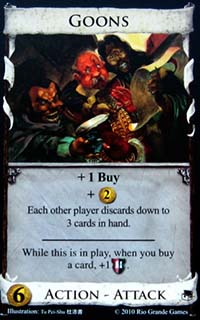
See the Additional Rules section for rules on  tokens. You get 1
tokens. You get 1  for each card you buy, but do not get a
for each card you buy, but do not get a  for gaining a card some other way. Multiple copies of Goons are cumulative; if you have two Goons in play and buy a Silver, you get 2
for gaining a card some other way. Multiple copies of Goons are cumulative; if you have two Goons in play and buy a Silver, you get 2  . However if you King's Court a Goons, despite having played the card 3 times, there is still only one copy of it in play, so buying Silver would only get you 1
. However if you King's Court a Goons, despite having played the card 3 times, there is still only one copy of it in play, so buying Silver would only get you 1  .
.
Grand Market
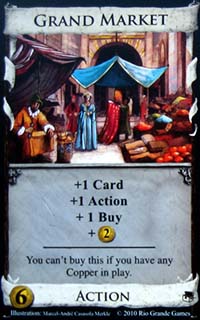
You do not have to play all of the Treasures in your hand in your Buy phase. Coppers in your hand do not stop you from buying Grand Market only Coppers in play do.
Coppers that were in play earlier in the turn but are not anymore also don't stop you; if you have 11 Coppers in play and 2 Buys, you could buy a Mint, trash all of your played Treasures, and then buy a Grand Market. You can gain Grand Market other ways - for example with Expand - whether or not you have Coppers in play.
Treasures other than Copper do not prevent you from buying Grand Market, even if they are worth  (such as Loan).
(such as Loan).
Hoard
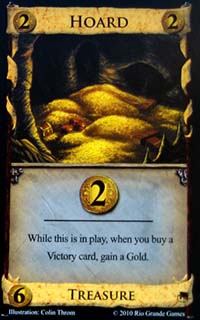
This is a Treasure worth  , like Silver. When you buy a Victory card with this in play, you gain a Gold card from the Supply, putting it into your discard pile. If there are no Golds left, you do not get one. If you have multiple Hoards in play, you will gain multiple Golds from buying a single Victory card. If you buy multiple Victory cards, you will get Gold for each one.
, like Silver. When you buy a Victory card with this in play, you gain a Gold card from the Supply, putting it into your discard pile. If there are no Golds left, you do not get one. If you have multiple Hoards in play, you will gain multiple Golds from buying a single Victory card. If you buy multiple Victory cards, you will get Gold for each one.
So for example if you had two Hoards in play and no other money, with +1 Buy, you could buy two Estates and gain four Golds. Victory cards include cards that are other types as well, such as Nobles and Harem in Dominion: Intrigue.
You gain a Gold even if you use Watchtower to immediately trash the Victory card you gained. Victory cards gained other than by buying them do not get you Gold.
King's Court
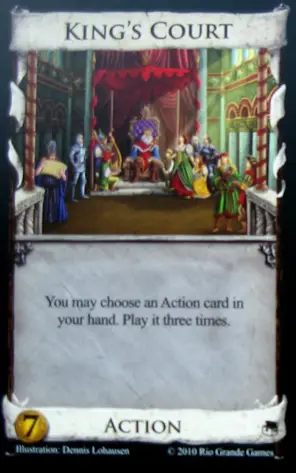
This is similar to Throne Room (from Dominion), but plays the Action three times rather than twice. You pick another Action card in your hand, play it, play it again, and play it a third time.
This does not use up any extra Actions you were allowed to play due to cards like Worker's Village - King's Court itself uses up one Action and that is it. You cannot play any other cards in between resolving the King's Court-ed Action card multiple times, unless that Action card specifically tells you to (such as King's Court itself does).
If you King's Court a King's Court, you will play three different Actions after that, playing each one of them three times - you do not play one Action nine times. If you King's Court a card that gives you +1 Action, such as Grand Market, you will end up with 3 Actions left afterwards, not the 1 Action you would have if you just played three Grand Markets.
Loan

This is a Treasure worth  , like Copper. When you play it, you reveal cards from the top of your deck until revealing a Treasure card, and then you decide whether to trash that card or discard it.
, like Copper. When you play it, you reveal cards from the top of your deck until revealing a Treasure card, and then you decide whether to trash that card or discard it.
Then you discard all of the other revealed cards. If you run out of cards before revealing a Treasure, shuffle your discard pile (but not the revealed cards) to get more; if you still do not find a Treasure, just discard all of the revealed cards. Remember that you can play Treasures in any order in the Buy phase and can choose not to play some of your Treasures if you want.
Mint

When you buy this, you trash all of your Treasure cards in play. You do not trash Treasure cards in your hand or elsewhere; just the ones in play, if any. If you buy multiple cards in a turn, trash your Treasures right when you buy Mint; you still have any leftover coins they produced for spending on something else.
Remember you do not have to play all of the Treasures from your hand each turn (just all the ones you want producing money for you). You do not get additional chances to play Treasure cards between buys in the Buy phase; first you play Treasures, then you buy cards.
When you play Mint, you reveal a Treasure card from your hand and gain a copy of it from the Supply. The gained card goes into your discard pile. The revealed card stays in your hand. The Treasure card can also have other types, like Harem (from Dominion: Intrigue).
If you buy a Mint and use Watchtower to put it on top of your deck or trash it, you still trash all of your Treasures from play. However, if you buy a Mint with Royal Seal in play, the Royal Seal will be gone before you can use it to put Mint on your deck.
Monument

See the game rules section for rules on  tokens.
tokens.
Mountebank
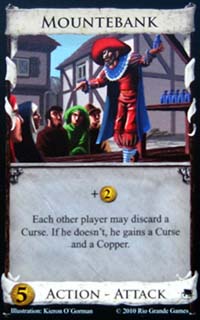
This hits the other players in turn order when that matters (such as when the Curse or Copper pile is low). Each of the other players in turn chooses whether or not to discard a Curse card from his hand, and if he does not, gains a Curse and a Copper from the Supply, putting them into his discard pile.
If either the Curse or Copper pile is empty, he still gains the other one. If both are empty, he does not gain either, but can still discard a Curse if he wants to. A player using Moat (from Dominion) on this may not discard a Curse, and doesn't gain a Curse or Copper - you cannot Moat just part of the attack. A player using Watchtower on this can use it just to trash the Curse, just to trash the Copper, or to trash both.
Peddler
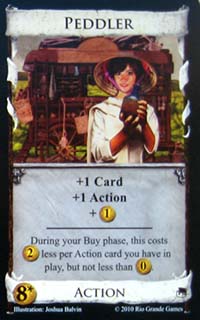
Most of the time, this costs  . During Buy phases, this costs less per Action card you have in play. This cost applies to all Peddler cards, including ones in hands and decks.
. During Buy phases, this costs less per Action card you have in play. This cost applies to all Peddler cards, including ones in hands and decks.
It never costs less than  . If you play King's Court on Worker's Village, for example, that is just two Action cards you have in play, even though you played the Worker's Village three times. Buying cards using the promotional card Black Market is something that does not happen during a Buy phase, so Peddler still costs then.
. If you play King's Court on Worker's Village, for example, that is just two Action cards you have in play, even though you played the Worker's Village three times. Buying cards using the promotional card Black Market is something that does not happen during a Buy phase, so Peddler still costs then.
Platinum

This is not a Kingdom card. You do not use it every game; see the setup section. It is a Treasure worth  .
.
Quarry
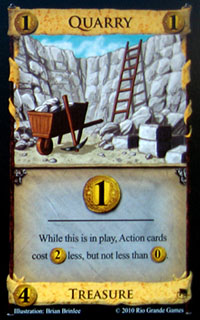
This is a Treasure worth  , like Copper. While it is in play, Action cards cost
, like Copper. While it is in play, Action cards cost  less, to a minimum of
less, to a minimum of  . It is cumulative; if you play two Quarries during your Buy phase, then King's Court will only cost
. It is cumulative; if you play two Quarries during your Buy phase, then King's Court will only cost  , rather than the usual
, rather than the usual  .
.
It affects the costs of cards that are Actions plus another type, such as Nobles (an Action - Victory card in Dominion: Intrigue). It is also cumulative with other effects that modify costs; if you play Worker's Village in your Action phase, then two Quarries in your Buy phase, Peddler will cost  . It affects the costs of cards everywhere, such as cards in players' hands.
. It affects the costs of cards everywhere, such as cards in players' hands.
Rabble
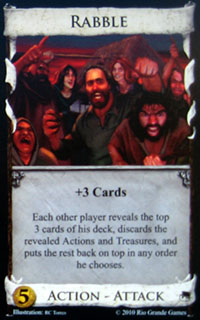
The other players shuffle if necessary to get 3 cards to reveal, and just reveal what they can if they still have fewer than 3 cards. They discard revealed Treasures and Actions and put the rest back on top in whatever order they want. Cards with more than one type match all of their types; for example if a player reveals Nobles from Dominion: Intrigue, it is an Action - Victory card, which means it is an Action, so he discards it.
Royal Seal
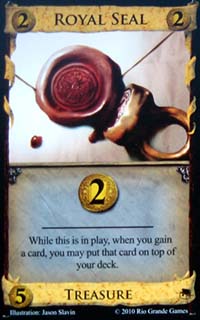
This is a Treasure worth  , like Silver. If you gain multiple cards with this in play, this applies to each of them - you could put any or all of them on top of your deck.
, like Silver. If you gain multiple cards with this in play, this applies to each of them - you could put any or all of them on top of your deck.
If you use this ability and there are no cards left in your deck, you do not shuffle; the card you gained becomes the only card in your deck. Royal Seal applies to all cards you gain while it is in play, whether bought or gained other ways.
If you play the Dominion: Alchemy card Possession, and during the extra turn you have the possessed player play Royal Seal, he cannot put the card on his deck - he is not gaining the card, you are.
Talisman
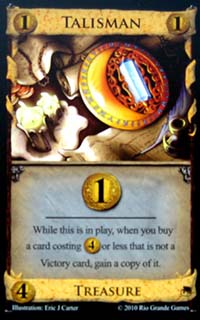
This is a Treasure worth  like Copper. Each time you buy a non-Victory card costing
like Copper. Each time you buy a non-Victory card costing  or less with this in play, you gain another copy of the bought card.
or less with this in play, you gain another copy of the bought card.
If there are no copies left, you do not gain one. The gained card comes from the Supply and goes into your discard pile. If you have multiple Talismans, you gain an additional copy for each one; if you buy multiple cards for  or less, Talisman applies to each one.
or less, Talisman applies to each one.
For example if you have two Talismans, four Coppers, and two Buys, you could buy Silver and Trade Route, gaining two more Silvers and two more Trade Routes. Talisman only affects buying cards; it does not work on cards gained other ways, such as with Expand.
A card is a Victory card if Victory is any of its types; for example Great Hall from Dominion: Intrigue is an Action - Victory card, so it is a Victory card. Talisman only cares about the cost of the card when you buy it, not its normal cost; so for example it can get you a Peddler if you have played two Actions this turn, thus lowering Peddler's cost to  , or can get you a Grand Market if you played Quarry.
, or can get you a Grand Market if you played Quarry.
Trade Route
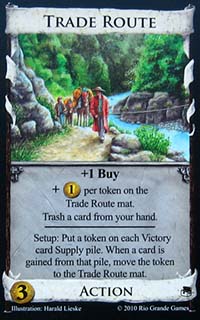
You get an additional Buy to use in your Buy phase. You get +  per token on the Trade Route mat. Then you trash a card from your hand. If you have no cards left in hand, you do not trash one.
per token on the Trade Route mat. Then you trash a card from your hand. If you have no cards left in hand, you do not trash one.
The amount you get from Trade Route is the same as +  per Victory card pile that a card has been gained from this game. If Victory cards have been gained from outside the Supply piles, for example using the promotional card Black Market, then this does not count those.
per Victory card pile that a card has been gained from this game. If Victory cards have been gained from outside the Supply piles, for example using the promotional card Black Market, then this does not count those.
Put a coin token on each Victory card pile at the start of the game. When a card is gained from a Victory card pile, move its token onto the Trade Route mat.
So for example if this game includes the Dominion: Intrigue card Harem, and so far Harem and Duchy have been bought, but no-one has bought (or otherwise gained) Estate or Province or Colony, then Trade Route makes  .
.
It does not matter who gained the cards or how they gained them. You do not get any extra money if a pile has had multiple cards gained from it or is empty; all that matters is if at least one card has been gained from it.
It does not matter if cards have been returned to a pile, such as with Ambassador from Dominion: Seaside; Trade Route only cares if a card was ever gained from the pile this game. If you are using Black Market and Trade Route is in the Black Market deck, put tokens on Victory card piles at the start of the game.
Vault
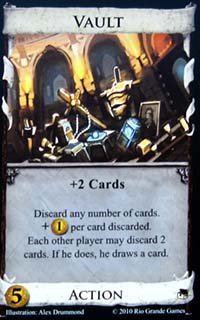
"Any number" includes zero. You draw cards first; you can discard the cards you just drew. Each other player chooses whether or not to discard 2 cards, then discards 2 cards if he chose to, then draws a card if he did discard 2 cards.
If one of the other players has just one card, he can choose to discard it, but will not draw a card. Another player who discards but then has no cards left to draw shuffles in the discards before drawing.
Venture

This is a Treasure card worth  , like Copper. When you play it, you reveal cards from your deck until revealing a Treasure card. If you run out of cards before revealing a Treasure, shuffle your discard pile (but not the revealed cards) to get more; if you still do not find a Treasure, just discard all of the revealed cards.
, like Copper. When you play it, you reveal cards from your deck until revealing a Treasure card. If you run out of cards before revealing a Treasure, shuffle your discard pile (but not the revealed cards) to get more; if you still do not find a Treasure, just discard all of the revealed cards.
If you do find a Treasure, discard the other cards and play the Treasure. If that Treasure does something when played, do that something. For example if Venture finds you another Venture, you reveal cards again. Remember that you choose what order to play Treasure cards; for example if you have both Venture and Loan in hand, you can play either one first.
Watchtower
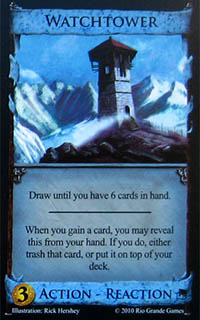
When you play this, you draw cards one at a time until you have 6 cards in hand. If you have 6 or more cards in hand already, you do not draw any cards. When you gain a card, even on someone else's turn, you may reveal Watchtower from your hand, to either trash the gained card or put it on top of your deck.
You may reveal Watchtower each time you gain a card; for example if another player plays Mountebank, you may use Watchtower to trash both the Curse and Copper, or to trash the Curse and put the Copper on top of your deck, or just to trash the Curse, and so on.
You still did gain whatever card you gained; you just immediately trash it. So if Mountebank gives you a Curse and you trash it, the Curse pile will go down by one as the Curse gets moved to the trash pile.
You may reveal Watchtower on your own turn as well, for example when buying a card, or gaining a card via something like Expand. If you use Watchtower to put a card on your deck but have no cards left in your deck, you do not shuffle; the gained card becomes the only card in your deck.
Revealing Watchtower does not take it out of your hand; you could reveal Watchtower on multiple opponents' turns and still have it on your turn to draw up to 6 with.
When cards are gained during a Possession turn (from Dominion: Alchemy), the player who played Possession is the one who can use Watchtower, not the player who is being possessed. If a gained card is going somewhere other than to your discard pile, such as a card gained with Mine (from Dominion), you can still use Watchtower to trash it or put it on your deck.
Worker's Village
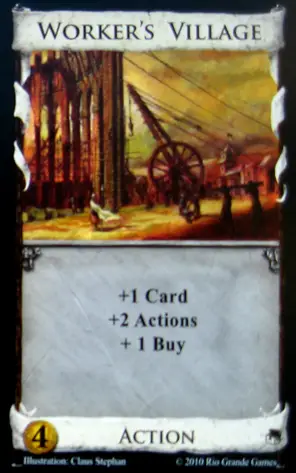
You draw a card, can play two more Actions this turn, and can buy one more card in your Buy phase this turn.
Continue Reading
